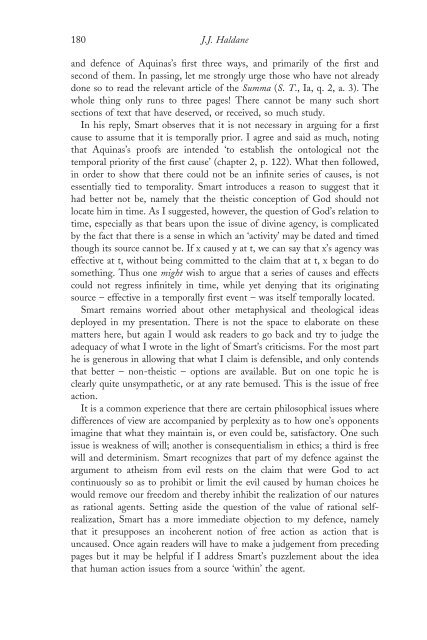Atheism and Theism JJ Haldane - Common Sense Atheism
Atheism and Theism JJ Haldane - Common Sense Atheism
Atheism and Theism JJ Haldane - Common Sense Atheism
Create successful ePaper yourself
Turn your PDF publications into a flip-book with our unique Google optimized e-Paper software.
180 J.J. <strong>Haldane</strong><br />
<strong>and</strong> defence of Aquinas’s first three ways, <strong>and</strong> primarily of the first <strong>and</strong><br />
second of them. In passing, let me strongly urge those who have not already<br />
done so to read the relevant article of the Summa (S. T., Ia, q. 2, a. 3). The<br />
whole thing only runs to three pages! There cannot be many such short<br />
sections of text that have deserved, or received, so much study.<br />
In his reply, Smart observes that it is not necessary in arguing for a first<br />
cause to assume that it is temporally prior. I agree <strong>and</strong> said as much, noting<br />
that Aquinas’s proofs are intended ‘to establish the ontological not the<br />
temporal priority of the first cause’ (chapter 2, p. 122). What then followed,<br />
in order to show that there could not be an infinite series of causes, is not<br />
essentially tied to temporality. Smart introduces a reason to suggest that it<br />
had better not be, namely that the theistic conception of God should not<br />
locate him in time. As I suggested, however, the question of God’s relation to<br />
time, especially as that bears upon the issue of divine agency, is complicated<br />
by the fact that there is a sense in which an ‘activity’ may be dated <strong>and</strong> timed<br />
though its source cannot be. If x caused y at t, we can say that x’s agency was<br />
effective at t, without being committed to the claim that at t, x began to do<br />
something. Thus one might wish to argue that a series of causes <strong>and</strong> effects<br />
could not regress infinitely in time, while yet denying that its originating<br />
source – effective in a temporally first event – was itself temporally located.<br />
Smart remains worried about other metaphysical <strong>and</strong> theological ideas<br />
deployed in my presentation. There is not the space to elaborate on these<br />
matters here, but again I would ask readers to go back <strong>and</strong> try to judge the<br />
adequacy of what I wrote in the light of Smart’s criticisms. For the most part<br />
he is generous in allowing that what I claim is defensible, <strong>and</strong> only contends<br />
that better – non-theistic – options are available. But on one topic he is<br />
clearly quite unsympathetic, or at any rate bemused. This is the issue of free<br />
action.<br />
It is a common experience that there are certain philosophical issues where<br />
differences of view are accompanied by perplexity as to how one’s opponents<br />
imagine that what they maintain is, or even could be, satisfactory. One such<br />
issue is weakness of will; another is consequentialism in ethics; a third is free<br />
will <strong>and</strong> determinism. Smart recognizes that part of my defence against the<br />
argument to atheism from evil rests on the claim that were God to act<br />
continuously so as to prohibit or limit the evil caused by human choices he<br />
would remove our freedom <strong>and</strong> thereby inhibit the realization of our natures<br />
as rational agents. Setting aside the question of the value of rational selfrealization,<br />
Smart has a more immediate objection to my defence, namely<br />
that it presupposes an incoherent notion of free action as action that is<br />
uncaused. Once again readers will have to make a judgement from preceding<br />
pages but it may be helpful if I address Smart’s puzzlement about the idea<br />
that human action issues from a source ‘within’ the agent.

















